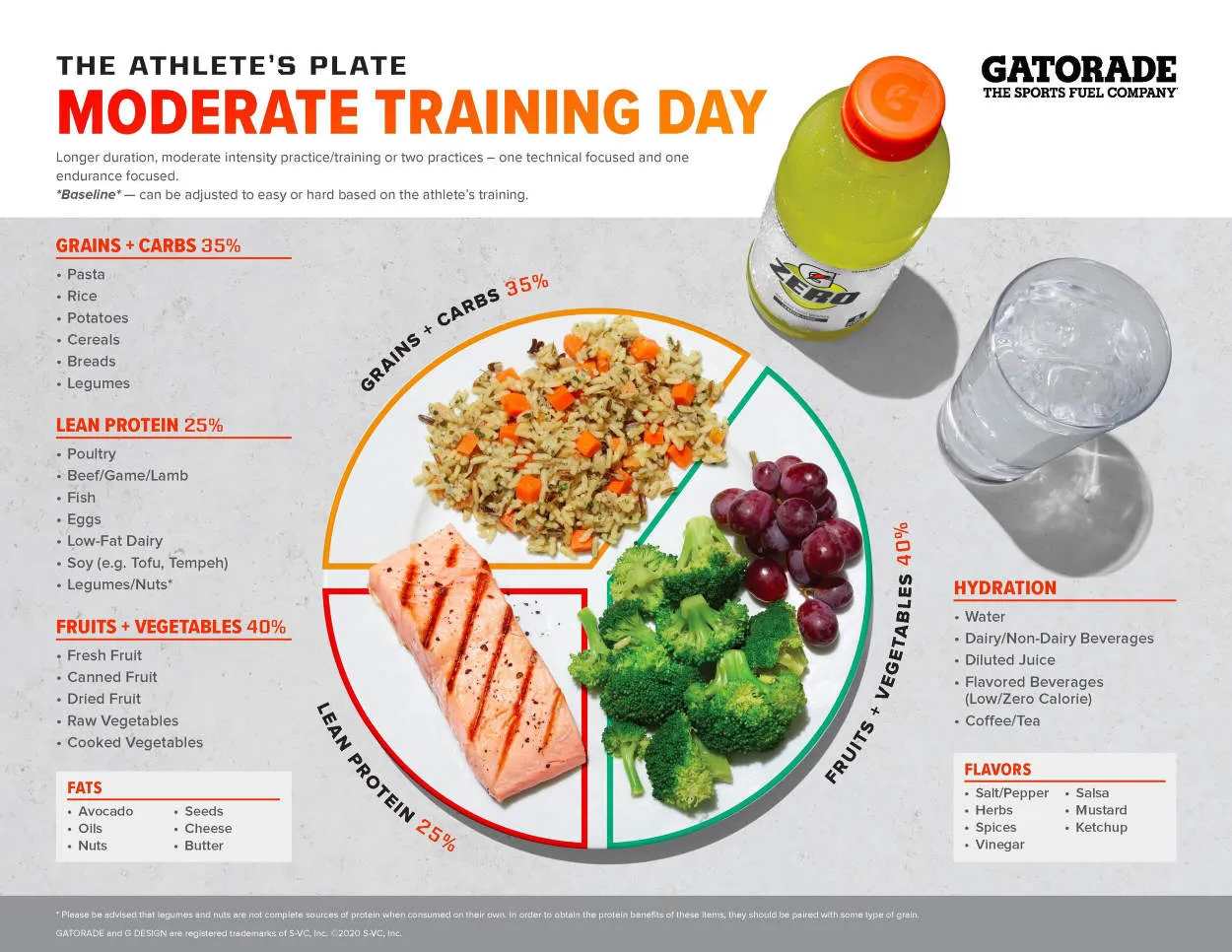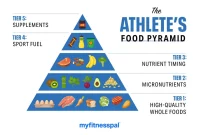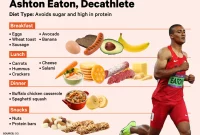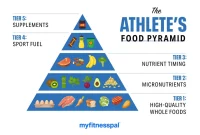When it comes to achieving peak athletic performance, proper nutrition plays a crucial role. Building an athlete’s plate requires careful consideration of macronutrients, micronutrients, and timing of meals. In this article, we will explore the key principles of nutrition that athletes should follow to optimize their performance on and off the field.
Balancing Macronutrients for Optimal Energy
In order to fuel their bodies and achieve peak performance, athletes need to pay close attention to their nutrition. One important aspect of an athlete’s diet is the careful balancing of macronutrients, which are the nutrients required in large amounts by the body: carbohydrates, proteins, and fats.
Carbohydrates are the primary source of energy for the body, especially during intense workouts or competitions. They are found in foods such as grains, fruits, and vegetables. Athletes should aim to consume a sufficient amount of carbohydrates to replenish glycogen stores and support their energy needs.
Proteins are crucial for muscle repair and growth. Athletes should include lean sources of protein in their diet, such as chicken, fish, lean meats, and plant-based proteins like beans and tofu. Consuming an adequate amount of protein will help athletes build and maintain strong muscles.
Fats play an important role in providing energy during endurance exercises and supporting overall health. Healthy sources of fats include avocados, nuts, seeds, and oils like olive oil. Athletes should opt for unsaturated fats while limiting saturated and trans fats, which can negatively affect performance and health.
It’s essential for athletes to create a well-balanced plate that includes all three macronutrients. Depending on the specific sport or activity, the ratios of carbohydrates, proteins, and fats may vary. Consulting with a sports nutritionist or dietitian can be beneficial in determining the ideal macronutrient distribution for individual performance goals.
Remember, the key to optimal energy lies in finding the right balance of macronutrients for your body. By fueling yourself with the right combination of carbohydrates, proteins, and fats, you can perform at your best and achieve your athletic goals.
The Role of Colorful Foods in an Athlete’s Diet
When it comes to building an athlete’s plate, nutrition plays a crucial role in optimizing performance. One fundamental aspect to consider is incorporating a variety of colorful foods into their diet.
Colorful fruits and vegetables are packed with essential nutrients such as vitamins, minerals, and antioxidants. These nutrients provide various benefits that can aid athletes in their training and recovery process. Here are some reasons why colorful foods should be a staple in an athlete’s diet:
1. Boosting Immunity
The vibrant colors in fruits and vegetables indicate the presence of phytochemicals, which have immune-boosting properties. By consuming a range of colorful produce like oranges, berries, bell peppers, and leafy greens, athletes can strengthen and support their immune system, reducing the risk of illnesses that could hinder their performance.
2. Fighting Inflammation
Inflammation often accompanies intense physical activity. The antioxidants found in colorful foods help combat this inflammation and aid in muscle recovery. Berries, cherries, tomatoes, and dark leafy greens are excellent choices for reducing exercise-induced inflammation.
3. Enhancing Performance
Proper nutrition is vital for optimizing athletic performance. By incorporating a variety of colorful foods, athletes can ensure they receive a wide range of nutrients and minerals necessary for energy production, muscle function, and overall endurance. For example, oranges and bananas provide essential electrolytes, while beets and watermelon can enhance endurance.
4. Supporting Bone Health
Athletes put their bones under significant stress, making it crucial to prioritize bone health. Colorful foods like broccoli, sweet potatoes, and berries contain nutrients like vitamin C, vitamin K, calcium, and phytochemicals that support bone density and integrity.
When planning an athlete’s plate, remember to incorporate a rainbow of fruits and vegetables to reap the benefits of their colorful nutrients. Providing a diverse range of natural colors not only enhances the visual appeal of meals but also ensures a well-rounded and complete nutritional intake for optimum athletic performance.
Pre- and Post-Workout Meal Ideas
When it comes to optimizing performance, nutrition plays a crucial role for athletes. Consuming the right pre- and post-workout meals can provide the necessary energy and nutrients to enhance athletic performance and aid in recovery.
Pre-Workout Meal Ideas
Before a workout, it is important to fuel your body with carbohydrates for energy and protein for muscle repair. Some pre-workout meal ideas include:
- Whole grain toast with peanut butter and banana slices
- Greek yogurt with berries and a handful of nuts
- Oatmeal topped with protein powder and mixed berries
Post-Workout Meal Ideas
After a workout, your body needs replenishment to repair muscles and restore energy levels. Here are some post-workout meal ideas:
- Grilled chicken breast with quinoa and steamed vegetables
- Salmon with sweet potatoes and roasted asparagus
- Protein smoothie with spinach, almond milk, and a scoop of protein powder
Remember to hydrate adequately before, during, and after exercise to stay hydrated and support optimal performance. It is also important to listen to your body and adjust your meals according to your dietary needs and preferences.
Debunking Nutrition Myths in Sports
Athletes are constantly seeking ways to optimize their performance, and one crucial factor that plays a significant role is nutrition. However, amidst the wealth of information available, there are several nutrition myths that need debunking. Let’s explore some common misconceptions and set the record straight.
1. Carbohydrates are the Enemy
One prevailing myth suggests that carbohydrates should be avoided as they lead to weight gain and hinder athletic performance. In reality, carbohydrates are an essential source of energy for athletes. The key lies in choosing complex carbohydrates such as whole grains, fruits, and vegetables, which provide sustained energy and vital nutrients.
2. Protein is All That Matters
While protein is vital for muscle repair and growth, an excessive focus on protein alone can overshadow other essential nutrients. It is crucial to maintain a well-rounded diet that includes a variety of macronutrients, such as carbohydrates and healthy fats, to support overall athletic performance.
3. Fat Should be Avoided
Fat is often mistakenly demonized, leading athletes to avoid it altogether. However, healthy fats are crucial for hormone production, joint health, and the absorption of fat-soluble vitamins. Include sources of healthy fats like avocados, nuts, seeds, and olive oil in your diet to reap the benefits.
4. Supplements are a Must
While supplements can be beneficial in certain situations, they are not a substitute for a well-balanced diet. Many athletes can meet their nutritional needs through whole foods alone. Prioritize consuming a variety of nutrient-dense foods rather than relying solely on supplements.
5. Hydration is Only Necessary During Exercise
A common misconception is that hydration is only important during workouts or competitions. Adequate hydration throughout the day is crucial for optimal performance. Make sure to drink water regularly and monitor urine color to ensure proper hydration levels.
6. All Calories are Created Equal
Not all calories are created equal, and the quality of the calories matters. While it’s essential to meet energy needs, focusing on nutrient-dense foods will provide the necessary vitamins, minerals, and antioxidants that play a crucial role in supporting an athlete’s overall health and performance.
By debunking these prevalent nutrition myths, athletes can make informed decisions about their diet and optimize their performance on the field. Remember, consult with a registered dietitian or sports nutrition professional to personalize your nutrition plan based on your specific needs and goals.
Vegetarian and Vegan Diets for Athletes
Athletes often follow specific diets to optimize their performance and ensure they meet their nutritional needs. While traditional sports nutrition has focused on animal-based protein sources, vegetarian and vegan diets are becoming increasingly popular among athletes. These plant-based diets can provide the necessary nutrients for athletes to excel in their chosen sports.
Meeting Protein Requirements
One common concern for athletes following a vegetarian or vegan diet is whether they can consume enough protein. However, with careful planning, athletes can easily meet their protein requirements. Plant-based protein sources such as legumes, tofu, tempeh, seitan, and quinoa are excellent options. Additionally, a variety of plant-based protein powders and supplements are available to support athletes in meeting their protein needs.
Obtaining Essential Nutrients
Vegetarian and vegan diets can provide all the necessary vitamins and minerals for athletes. By including a variety of fruits, vegetables, whole grains, nuts, and seeds, athletes can meet their requirements for vitamins, minerals, and fiber. However, it is important to pay attention to certain nutrients that are typically found in higher quantities in animal products, such as iron, calcium, and vitamin B12. Athletes should consider incorporating plant-based sources of these nutrients or, if necessary, discuss supplementation with a healthcare professional.
Improving Recovery and Reducing Inflammation
Plant-based diets have been associated with improved recovery and reduced inflammation, which are crucial for athletes. The high antioxidant content of many plant foods can help mitigate oxidative stress caused by intense exercise. Additionally, the anti-inflammatory properties of certain plant compounds can aid in reducing muscle soreness and accelerate the healing process.
Benefitting the Environment and Ethical Considerations
Adopting a vegetarian or vegan diet can also align with an athlete’s values and ethical considerations. Many athletes are concerned about the impact of animal agriculture on the environment and choose plant-based diets as a way to reduce their ecological footprint. By selecting sustainable, plant-based options, athletes can contribute to environmental preservation and animal welfare.
In Conclusion
Vegetarian and vegan diets can be suitable for athletes, providing all the necessary nutrients for optimal performance and recovery. By carefully planning their meals and considering potential nutrient gaps, athletes can thrive on a plant-based diet while aligning with their values and contributing to a sustainable future.
Conclusion
In conclusion, nutrition plays a critical role in the performance of athletes. A well-balanced and properly timed diet can provide the necessary energy, macronutrients, and micronutrients needed for optimal performance and recovery. Athletes should prioritize consuming a variety of whole foods, staying hydrated, and paying attention to nutrient timing to support their athletic goals and maintain overall health.




